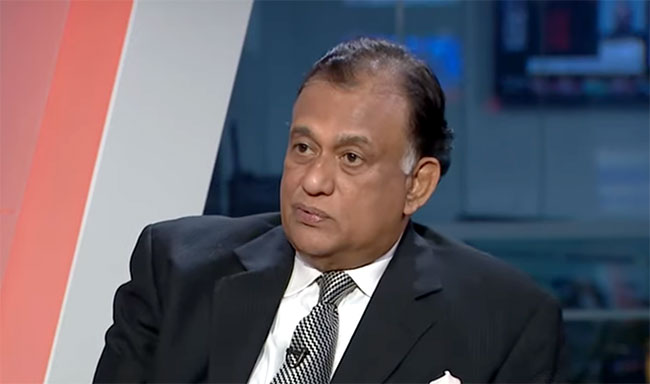-By A Special Correspondent

(Lanka-e-News -02.Aug.2025, 10.15 PM) A Sri Lankan High Court has ruled that a long-delayed corruption case against former Minister Rohitha Bogollagama will proceed in absentia, setting a landmark date of October 30 for hearings—despite the ex-minister’s continued stay in the United Kingdom.
Bogollagama, who once served as Sri Lanka’s Minister for Enterprise Development and Investment Promotion, is accused of serious financial misconduct under the country’s Bribery Act. He has been living in self-imposed exile in Britain since the change of government in 2022, having previously served as Sri Lanka’s High Commissioner to the UK under the Rajapaksa administration.
The High Court's ruling on Thursday (1 August) came after the country’s Commission to Investigate Allegations of Bribery or Corruption (CIABOC) made a formal request to proceed without the defendant being present in court. Presiding judge Mahesh Weeraman acknowledged Bogollagama's prolonged absence and confirmed that court proceedings would go ahead with or without his presence.
The allegations date back to 2006, when Bogollagama served as Investment Promotion Minister during the presidency of Mahinda Rajapaksa. CIABOC filed charges against him in 2015, during the so-called Yahapalana (good governance) era, under provisions of the Bribery Act.
At the heart of the case is a London investment exhibition hosted by the Board of Investment (BOI) between 21–23 June 2006. Bogollagama, as the minister in charge, is accused of violating Treasury regulations by pressuring BOI officials to illegally approve Rs. 1.17 million (approx. £3,000) for his personal hotel expenses, in addition to a further Rs. 414,000 for unspecified purposes. CIABOC claims the expenditures were unauthorised and amounted to an abuse of public office for private gain.
The indictment includes 10 co-defendants and lists 15 key documents as evidence. The prosecution alleges that Bogollagama’s actions constitute a clear breach of financial discipline and an offence under Sri Lanka’s anti-corruption laws.
The former minister’s trajectory since the original filing is emblematic of Sri Lanka’s patchy record on political accountability.
Though briefly brought before court in 2015 and granted bail, his passport was impounded by the judiciary. However, in the months that followed—with the Rajapaksas returning to power—Bogollagama was appointed Sri Lanka’s High Commissioner to the UK, a position he held even as media outlets, including Lanka eNews, published recurring exposés about his allegedly lavish and irregular conduct in office.
Following the electoral defeat of the Rajapaksa regime in 2022, Bogollagama and his family opted to remain in Britain rather than return to Sri Lanka, where the new NPP-led administration under President Anura Kumara Dissanayake began revisiting stalled corruption investigations.
For many observers, Bogollagama’s case has become symbolic of the broader challenges in enforcing accountability among Sri Lanka’s political elite.
"This is a test case—not just about one individual, but about whether Sri Lanka has the institutional courage to bring its former political class to justice," said a legal analyst familiar with the proceedings. “The fact that he continues to reside freely in the UK, despite a serious corruption indictment, raises troubling questions about international cooperation and the moral obligation of democratic governments.”
Bogollagama’s current immigration status in the UK remains unclear. There has been no confirmation of whether an extradition request has been formally made or if British authorities are cooperating with Sri Lankan officials on the matter.
With the Colombo High Court setting 30 October as the start date for hearings, it will be the first time in recent history that a former Sri Lankan cabinet minister is tried in absentia for financial crimes.
Legal experts say this is possible under Sri Lankan criminal procedure if a defendant is repeatedly absent and has made no credible effort to appear. The prosecution is expected to rely heavily on documentary evidence and the testimonies of public officials within the BOI and the Treasury.
CIABOC has indicated that further attempts may be made to have Bogollagama declared a fugitive under Sri Lankan law, and to seek international remedies—including the possibility of issuing an Interpol Red Notice.
The delay in prosecuting Bogollagama has often been attributed to political interference and shifting loyalties across successive governments. His appointment to the High Commission post in London, despite standing corruption charges, exemplified how state positions were used as shields against legal scrutiny.
Now, under the NPP administration, there is growing public pressure to pursue such cases to their conclusion. President Dissanayake has vowed to end the culture of “elite immunity” that allowed former ministers to live in luxury abroad while evading justice at home.
“People are watching,” said a source within CIABOC. “The credibility of this government’s anti-corruption stance depends on cases like this. If they can’t bring people like Bogollagama to account, what hope is there for the rest?”
As of publication, Rohitha Bogollagama has made no public statement regarding the trial. Attempts to contact his legal representatives in the UK were unsuccessful. Meanwhile, civil society organisations have begun calling for the UK government to cooperate with Sri Lanka’s authorities and clarify his residency status.
“If this government is serious about ending corruption,” one human rights advocate said, “then this case must not end in silence.”
As the October court date approaches, the Bogollagama affair is shaping into a legal and political litmus test—one that could define the legacy of Sri Lanka’s new administration and its promise to clean up a system that has, for too long, allowed the powerful to escape through foreign doors.
-By A Special Correspondent
---------------------------
by (2025-08-02 16:43:07)
Leave a Reply